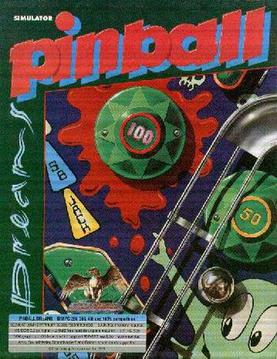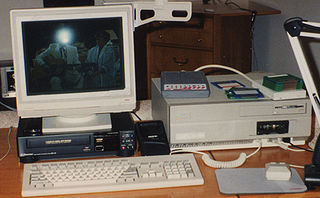
Amiga is a family of personal computers introduced by Commodore in 1985. The original model is one of a number of mid-1980s computers with 16- or 16/32-bit processors, 256 KB or more of RAM, mouse-based GUIs, and significantly improved graphics and audio compared to previous 8-bit systems. These systems include the Atari ST—released earlier the same year—as well as the Macintosh and Acorn Archimedes. Based on the Motorola 68000 microprocessor, the Amiga differs from its contemporaries through the inclusion of custom hardware to accelerate graphics and sound, including sprites and a blitter, and a pre-emptive multitasking operating system called AmigaOS.

The Motorola 68060 ("sixty-eight-oh-sixty") is a 32-bit microprocessor from Motorola released in April 1994. It is the successor to the Motorola 68040 and is the highest performing member of the 68000 series. Two derivatives were produced, the 68LC060 and the 68EC060.
MetaComCo (MCC) was a computer systems software company started in 1981 and based in Bristol, England by Peter Mackeonis and Derek Budge. A division of Tenchstar, Ltd.

Pegasos is a MicroATX motherboard powered by a PowerPC 750CXe or PowerPC 7447 microprocessor, featuring three PCI slots, one AGP slot, two Ethernet ports, USB, DDR, AC'97 sound, and FireWire. Like the PowerPC Macintosh counterparts, it boots via Open Firmware.
PowerPC G4 is a designation formerly used by Apple to describe a fourth generation of 32-bit PowerPC microprocessors. Apple has applied this name to various processor models from Freescale, a former part of Motorola. Motorola and Freescale's proper name of this family of processors is PowerPC 74xx.

Pinball Fantasies is a 1992 pinball video game originally developed by Digital Illusions and published by 21st Century Entertainment in Europe for the Amiga home computers. It is the sequel to Pinball Dreams, which was released earlier in the same year on multiple platforms. In the game, players can choose between any of the four available playfields, both of which have their own thematic and main objectives in order to obtain the highest score possible.

Cinemaware was a video game developer and publisher. It had released several titles in the 1980s based on various film themes. The company was resurrected in 2000, before being acquired by eGames in 2005.

Pinball Dreams is a pinball simulation video game developed by Digital Illusions and originally released for the Amiga in 1992. It spawned several sequels, including Pinball Fantasies and Pinball Illusions. The MS-DOS port was digitally released by Rebellion Developments along with its sequel and Pinball Mania on February 22, 2011 on GOG.com with support for Microsoft Windows. It received an OS X build on April 23, 2013; and a Linux build on August 19, 2014.

Pinball Illusions is an Amiga and MS-DOS pinball video game developed by Digital Illusions CE (DICE) in 1995 as a sequel of Pinball Fantasies and Pinball Dreams.

Mark of the Unicorn (MOTU) is a music-related computer software and hardware supplier. It is based in Cambridge, Massachusetts and has created music software since 1984. In the mid-1980s, Mark of the Unicorn sold productivity software and several games for the Macintosh, Atari ST, and Amiga.

A power-on self-test (POST) is a process performed by firmware or software routines immediately after a computer or other digital electronic device is powered on.

The Faery Tale Adventure is a 1987 action role-playing video game designed by David Joiner and published by MicroIllusions for the Amiga, and later ported to the Commodore 64, MS-DOS, and Sega Genesis. The MS-DOS version is titled The Faery Tale Adventure: Book I. Microillusions also released a "Book 1" version for the Amiga which was going to be the start of a series of games, according to Talin, but bankruptcy prevented it. The initial version was produced for the Amiga 1000 and featured the largest game world to that date. A sequel, Faery Tale Adventure II: Halls of the Dead, was released in 1997.
Amiga software is computer software engineered to run on the Amiga personal computer. Amiga software covers many applications, including productivity, digital art, games, commercial, freeware and hobbyist products. The market was active in the late 1980s and early 1990s but then dwindled. Most Amiga products were originally created directly for the Amiga computer, and were not ported from other platforms.
MicroIllusions was a computer game developer and publisher of the home computer era. Based in Granada Hills, California, the company was a strong supporter of the Amiga and typically released titles on that platform before porting it to others.

Desktop video refers to a phenomenon lasting from the mid-1980s to the early 1990s when the graphics capabilities of personal computers such as the Commodore Amiga, the Apple Macintosh II and specially-upgraded IBM PC compatibles had advanced to the point where individuals and local broadcasters could use them for analog non-linear editing and vision mixing in video production. Despite the use of computers, desktop video should not be confused with digital video since the video data remained analog and it uses items like a VCR and a camcorder to record the video. Full-screen, full-motion video's vast storage requirements meant that the promise of digital encoding would not be realized on desktop computers for at least another decade.

Amiga Forever is an Amiga preservation, emulation and support package published by Cloanto, allowing Amiga software to run on non-Amiga hardware legally without complex configuration.

PowerUP boards were dual-processor accelerator boards designed by Phase5 Digital Products for Amiga computers. They had two different processors, a Motorola 68000 series (68k) and a PowerPC, working in parallel, sharing the complete address space of the Amiga computer system.

Haage & Partner is a German company established in 1995. The company distributes software products where they usually are the exclusive distributor. Products are aimed at Microsoft Windows and Mac OS, and has been aimed at AmigaOS in the past. The primary destination countries are Germany, Austria, and Switzerland.













